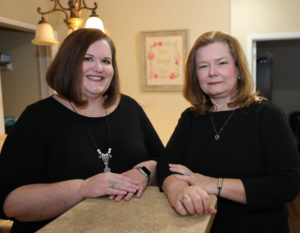This Ocala outreach offers independence to homeless women and their children.

A soft breeze ruffles the Spanish moss draping the enormous and ancient oak tree in the center of the Hope Villas campus in northeast Ocala. For many homeless women and children, the opportunities extended to them here are like a breath of fresh air as well.
The Hope Villas apartment complex has 40 units, one of which is the office of Project Hope of Marion County (PHMC), a nonprofit organization established in 2007 by a faith-based community group. At present, 25 of the two-bedroom, two-bath apartments are home to homeless women and their children; the other 14 units are rented at market value to help sustain the program.
“The greatest service we provide to Marion County is the transitional and supportive housing that we offer to single moms with children who are transitioning out of homelessness,” explains April McDonald, executive director of PHMC. “We are able to ensure that, at least right now, 25 women are not on the street with their children, in a car, on a friend’s couch, in an emergency shelter or at a rest stop. We encourage them, foster their self-sufficiency and help them to become independent so when they transition from our program, the likelihood of them ever being homeless again is much less.”
Under the program model, the women chosen to participate do not pay rent the first month. After that, they pay a subsidized fee to cover a portion of the rent as well as utilities. Once they find employment, the fees gradually increase until they can pay the full cost. The average residency is 12 to 18 months.
Along with McDonald, Administrative Coordinator Tami Webb, Case Manager Charlene Robinson and Program Mentor Robyn Wagner also help provide an array of services that include counseling, financial skills development and trauma recovery.
“This is such a wonderful program,” Webb offers. “There’s nothing else like it here.”
PHMC is governed by a board of directors who guide policy and assure financial stability. Because the organization is faith-based, it does not receive state or federal funding. McDonald says community support is integral to the continued success of the program.
“We continue to have a need for furniture donations, monthly monetary support, participa-tion in our annual fundraiser in October, mentoring and volunteering,” she shares. “When you clean out your closets and you have kitchen stuff, bring it to us because anything you would use in a new setup, we could use. And the beautiful thing about it is, when our ladies leave, they take all their donations with them. That’s why we constantly have a need for furniture, cleaning supplies, linens, lamps and anything like that. Sometimes they come in with just a backpack.”
PHMC estimates that domestic violence is the leading cause of homelessness for at least 60 percent of the women they serve. McDonald says there are currently 45 women on the waiting list for housing.
“Three years ago, we had seven units and today we have 25. We’re looking to expand,” McDonald notes. “In fact, we’ve written several grant proposals and if we get them, then we’re going to expand to the last 15 units, hopefully!”
To learn more, visit projecthopeocala.org






